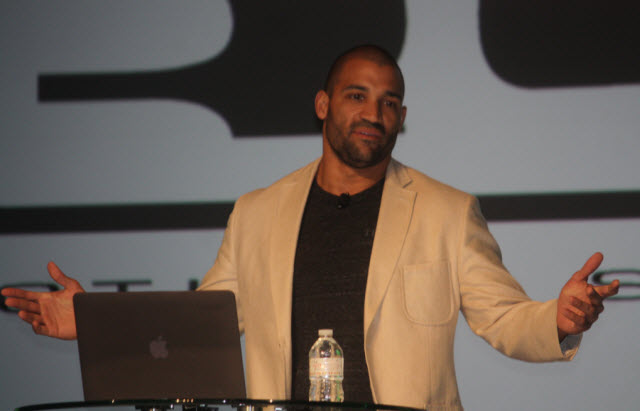
[Updated: Per Gilmore’s request, we are correctly identifying him as a former member of Seal Team Seven; we apologize for previously identifying him as a member of Seal Team Six]
U.S. Navy Seal Team Six became famous as an elite military group for succeeding in its quest to find and kill Osama Bin Laden. But a nine-year veteran from [Seal Team Seven] talked to an audience of game developers today about failing and how to deal with it.
Isaac Gilmore retired from the Seals last August and is now consulting as managing partner at 3SJ Tactical Solutions. It turns out that his experiences working with one of the most disciplined teams in the world is also useful for helping professionals deal with the lessons of failure and how to execute. He spoke to a group of game developers at the DICE Summit in Las Vegas. He now trains executives and consults on security.
“It is OK to make a mistake, but you learn from it and you never make that mistake again,” Gilmore said.
The Seals ensure the quality and culture of their team by setting up a gate. They only let in the people who can do the best. And success is defined by how well they execute missions as a team.
The Navy Seals worked in anonymity for a long time. But now that they are famous, the spotlight is on them. So the Seal leadership had to “tighten up” and make the team more disciplined so they would conduct themselves in a fitting manner under that increased scrutiny.
One of the problems that Gilmore saw in the field was that junior officers tended to micro-manage when they came under pressure. Those officers take the initiative away from their underlings, who can no longer make decisions on their own. The same thing happens to game companies that become successful and then come under the spotlight. They become too careful and less creative.
Gilmore said one of his challenges was balancing life and work. He was married and had two toddlers at a young age and couldn’t put all of his time into the Seals. He had to go to work feeling like he was either going to be a failure to the team or to his family. He couldn’t win until he decided he had to change his expectations.
“”I learned to accept where the balance was and pick my battles. That was very hard for me. I can’t talk about details, but one of the biggest failures of my life was 15 months ago and it was crippling,” he said. “That helped me open up full throttle toward being successful again. You have to create a gate for your organization, for your life, for your friends, and guard it fiercely. ”
After you fail, he said, the conversation should turn back to how you can learn on the other side of it.
You can hire a great team, but you have to make the decisions as the leader. You can value your team’s input and you have to realize that your job is to make the final decision.


